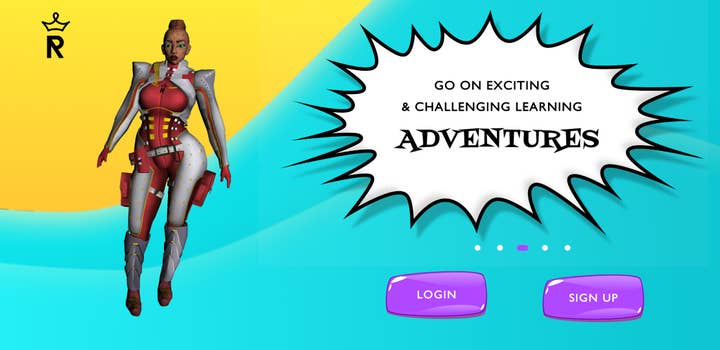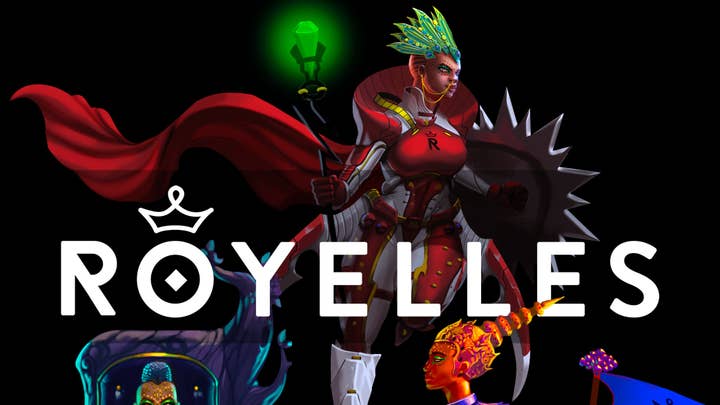Royelles: "The future of the metaverse is female"
CEO and founder Múkami Kinoti Kimotho explains the idea and intent behind the educational metaverse app for girls
As a parent of two children including an 11-year-old girl, Royelles CEO and founder Múkami Kinoti Kimotho noticed a shift several years ago that will likely be familiar to many parents. Her daughter and her friends transitioned from playing with toys to playing with mobile devices.
"It's how they create, it's how they connect, how they learn, and it's certainly how they have fun," Kimotho tells GamesIndustry.biz. "Mobile gaming is really at the heart of everything they do."
Kimotho had concerns about young girls spending so much of their time playing on mobile devices and in online worlds, and understood how their experiences there could feed into mental health issues, cyber bullying, body shaming, and other problems.
So if girls like her daughter were going to be spending so much time playing on mobile devices, Kimotho wanted it to be a net positive.

"It became my mission to leverage gaming, and more specifically educational gaming that is inclusive and safe, as a means of dismantling the erroneous mindsets our kids have and tackling the issues that parents, educators, and champions of all our girls in particular were struggling and grappling with," Kimotho says.
To that end, Kimotho has been working on Royelles, a mobile app billed as a metaverse platform for girls.
"I really feel like the future of the metaverse is female," she says, calling girls and women the fastest growing demographic in the space.
As for the app itself, the idea is "to broaden the standard of bravery, brilliance, beauty, and all things powerful so that girls across the globe begin to see themselves represented in the gaming experience."
Despite the metaverse tag, the Royelles app currently available on Google Play and the App Store is a strictly single-player affair. Multiplayer functionality, as with many features, is expected to be added within a year, but Kimotho says the company is deliberately taking things slower there to more carefully manage players' exposure to others, particularly with the target demographic being so young.
While players will have to wait for the online social component to appear in the app itself, Royelles has been hosting live virtual experiences, where 20-50 young gamers (plus their adult chaperones) gather on Zoom to explore topics in gamified ways, meet female and non-binary role models -- think activists, tech executives, or astronauts -- and find out about what a day in their life is like. One recent event was run with NASA and several Girl Scout chapters.
As for what's currently available in the app, there are a series of activities hosted by Mara, a princess whose mother wants her to be the first woman to lead her country's peacekeeping forces, while her own desire is to be the first person on Mars. Royelles includes a number of activities themed around Mara's interests, including facts about the solar system and a driving game where the player must safely guide a rover around the surface of Mars.

"The entire narrative is built around the idea that big dreams require courage and boldness and bravery," Kimotho says. "And anchoring yourself in authenticity and the idea that those qualities and characteristics that set you apart as different and unique are super powers."
So what's the business model for Royelles? The app is free-to-play, and Kimotho says users will eventually be able to pay for in-app experiences and customizations. The company is also talking with "mission-aligned organizations and corporate partners" about putting sponsored interstitial ads into various parts of the game.
"The entire narrative is built around the idea that big dreams require courage and boldness and bravery"
"There is also a huge opportunity from a B2B perspective, particularly with educational institutions and mission-aligned orgs," Kimotho says. "What we've built aligns really nicely to STEM, STEAM, social-emotional learning, leadership development and enrichment programming."
As for whether the company's explicit focus on building a metaverse for girls could limit that B2B potential, Kimotho says, "Yes but no."
"I think educators themselves have a huge concern that this demographic is not necessarily served well, and we don't have enough women in STEM fields," she says, adding that while the app is focused on girls, it doesn't prohibit engagement from people who identify as anything else.
As for getting the word out about the app, Kimotho says the marketing push is less concerned with targeting end users than the people who monitor their media diets.
"We have a go-to-market strategy that is pretty focused," Kimotho says. "It really is about working through their adult influencers because of the age range we're going after, we're talking to parents -- or the individuals in the parenting role in that child's life -- as well as their educators, mentors, champions, and others that are perhaps STEM/STEAM or girl empowerment enthusiasts."
As a result, Royelles is still competing with offerings like Roblox and Minecraft, but it can make the case to parents that time spent with its own app is more worthwhile for their kids.
"In my mind, any app out there that caters to 4-12 year olds and is engaging them is a competitor"
Kimotho also mentions secondary competitors like other outfits focused on inspiring and empowering girls. She mentions Rebel Girls -- an app with inspiring audio stories for girls -- as one such example, even if that company is more focused on books and stories than interactive game-like content.
"The reality is we're dealing with a generation who lives and breathes gaming, mobile gaming in particular," Kimotho says. "So in my mind, any app out there that caters to 4-12 year olds and is engaging them is a competitor."
To date, Royelles has been largely self-funded apart from a couple grants and prizes for winning some pitch competitions. Kimotho is hoping to explore venture capital options in the next six to 12 months. She'll naturally have to sell them on her vision of success and the potential for the app, but what does success with an educational and inspirational metaverse look like, exactly?
"Success is as simple as the child who engages with our platform recognizing how powerful they are and taking a bold, fearless, undaunted approach to being the best they can be and realizing their potential," Kimotho says, adding that's a success she wants to replicate millions -- or even hundreds of millions -- times over around the world.
"Success for us really is about creating awareness about what we've built, engaging with communities across the country and the globe, getting as much insight and feedback from them about this first iteration of what we've built, tweaking it quickly to address their needs, and bringing more and more to the market," she adds.

